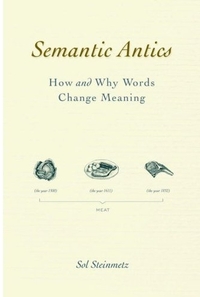

Purchase
How and Why Words Change Meaning
Random House
April 2008
On Sale: March 25, 2008
288 pages
ISBN: 0375426124
EAN: 9780375426124
Trade Size
Add to Wish List
Non-Fiction
A fun, new approach to examining
etymology!
Many common English words started out
with an entirely different meaning than the one we know
today. For example:
The word adamant
came into English around 855 C.E. as a synonym for
'diamond,' very different from today's meaning of the
word: "utterly unyielding in attitude or
opinion."
Before the year 1200, the word
silly meant "blessed," and was derived from
Old English saelig, meaning "happy." This word went
through several incarnations before adopting today's
meaning: "stupid or foolish."
In Semantic
Antics, lexicographer Sol Steinmetz takes readers on an
in-depth, fascinating journey to learn how hundreds of words
have evolved from their first meaning to the meanings used
today.
Comments
No comments posted.
Registered users may leave comments.
Log in or register now!
| 


 © 2003-2024 off-the-edge.net
all rights reserved Privacy Policy
© 2003-2024 off-the-edge.net
all rights reserved Privacy Policy